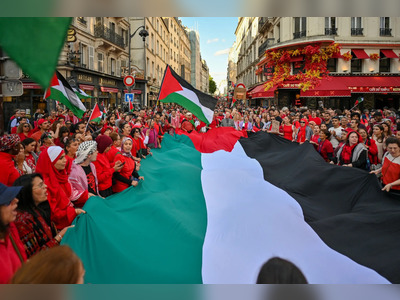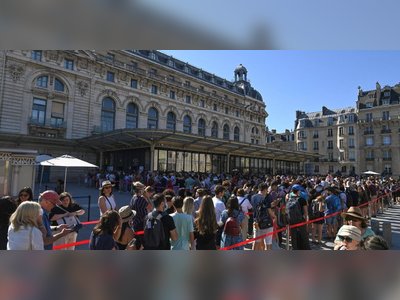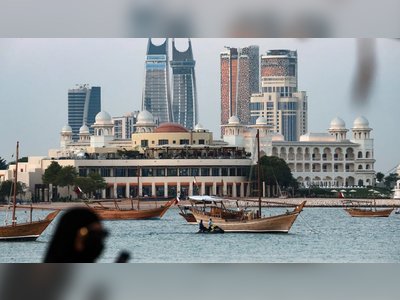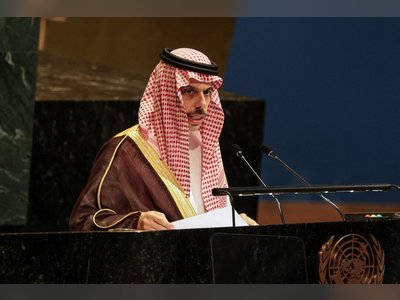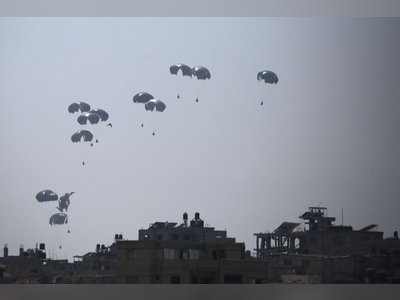Escalation of Conflict Between Iran and Israel: A Comprehensive Update
Following missile strikes and counterattacks, the humanitarian toll continues to rise amidst increasing military engagements.
On June 16, 2025, Iran launched missile strikes targeting major cities in Israel, resulting in at least five fatalities according to local emergency services.
This action marked a continuation of hostilities that have seen Israeli airstrikes reach Iranian territory for four consecutive nights.
In Tel Aviv, footage revealed extensively damaged buildings as firefighters conducted search and rescue operations for potential survivors amidst the rubble.
Additional projectiles reportedly struck cities such as Petah Tikva and Bnei Brak, close to Tel Aviv, as confirmed by local journalists.
Israeli Defense Minister Israel Katz warned that residents of Tehran 'will pay the price' for Iranian attacks on Israeli civilians.
The Islamic Revolutionary Guard Corps stated that the recent missile launches successfully targeted specific locations in Israel and promised ongoing 'more devastating' operations to follow.
These Iranian missile strikes were reportedly executed 'despite full support from the United States and Western powers' for Israel, as asserted by the ideological military branch of Iran's government.
Meanwhile, air raid sirens were activated in Jerusalem, where residents reported significant explosions that shook buildings.
The Israeli anti-aircraft defense system was deployed, with numerous missiles reportedly not intercepted.
Reports indicated thick plumes of smoke rising in the skies over Haifa following a missile strike in the northern part of Israel.
The Israeli emergency service, Magen David Adom, has reported five deaths and 92 injuries as a result of the missile attacks at four locations across the central region of Israel.
This barrage was a direct response to Israeli airstrikes that targeted Iran the previous night, with explosions heard in Tehran as air defense systems were activated.
Israeli officials confirmed strikes on Tehran that aimed at command centers belonging to the Quds Force, the elite unit of the Revolutionary Guards responsible for foreign operations.
Additionally, the Israeli Air Force targeted 'dozens' of surface-to-surface missile sites and military facilities throughout western Iran.
Following these operations, the Iranian Ministry of Health confirmed that at least 224 individuals had died in Iran since the onset of airstrikes on Friday, with over a thousand injuries reported.
From the Israeli perspective, retaliatory actions from Iran since Friday have led to 18 Israeli fatalities and nearly 400 injuries, according to police and emergency service reports compiled by local agencies.
Iranian President Massoud Pezeshkian called for unity among Iranians to 'stand firm' against what he termed a 'criminal aggression'.
This marks a significant escalation, with military confrontations intensifying between the two historically adversarial nations.
Earlier missile strikes from Iran struck the Tel Aviv region over the night of June 15-16, causing substantial destruction in Bat Yam, located south of the coastal city.
Residents expressed devastation, with one saying, 'There's nothing left, no house, it's finished!' A local reported that an air raid alert was issued, prompting residents to seek shelter just moments before a catastrophic event unfolded.
Further strikes on June 15 targeted numerous facilities in Tehran, including a residential building where five individuals were reported killed.
The Iranian government announced that mosques, metro stations, and schools would be designated as air raid shelters starting that evening.
Since the onset of Israeli airstrikes on Friday, three of Iran's top military officials and nine scientists involved in the country's nuclear program have reportedly been killed.
This triggering of a massive aerial campaign by Israel has raised significant concerns over the stability and security of the region.
Roads leading out of Tehran were congested with long lines of vehicles as residents sought to flee.
One displaced woman described her experiences, stating, 'We have not been able to sleep since Friday due to the terrible noise of explosions.
Today, they struck a house in our alley, and we were very scared.
We decided to leave Tehran.'
Israeli officials maintain that Iran is on the brink of achieving nuclear weapons capability, leading to the recent military escalation targeting hundreds of alleged military and nuclear sites across Iran.
Israeli assertions regarding Iran's intentions remain a point of contention, as Tehran denies such allegations and asserts its rights to pursue a civil nuclear program.
In response to the ongoing conflict, Israeli Prime Minister Benjamin Netanyahu indicated on American media that Israel had 'destroyed the main facility' at the uranium enrichment site in Natanz and suggested that military actions could reshape leadership in Iran.
European Commission President Ursula von der Leyen stated she had communicated to Netanyahu that diplomacy was the optimal long-term approach to addressing tensions with Iran.
U.S. President Donald Trump also called for both nations to find a resolution, indicating possible American involvement in the situation.
This action marked a continuation of hostilities that have seen Israeli airstrikes reach Iranian territory for four consecutive nights.
In Tel Aviv, footage revealed extensively damaged buildings as firefighters conducted search and rescue operations for potential survivors amidst the rubble.
Additional projectiles reportedly struck cities such as Petah Tikva and Bnei Brak, close to Tel Aviv, as confirmed by local journalists.
Israeli Defense Minister Israel Katz warned that residents of Tehran 'will pay the price' for Iranian attacks on Israeli civilians.
The Islamic Revolutionary Guard Corps stated that the recent missile launches successfully targeted specific locations in Israel and promised ongoing 'more devastating' operations to follow.
These Iranian missile strikes were reportedly executed 'despite full support from the United States and Western powers' for Israel, as asserted by the ideological military branch of Iran's government.
Meanwhile, air raid sirens were activated in Jerusalem, where residents reported significant explosions that shook buildings.
The Israeli anti-aircraft defense system was deployed, with numerous missiles reportedly not intercepted.
Reports indicated thick plumes of smoke rising in the skies over Haifa following a missile strike in the northern part of Israel.
The Israeli emergency service, Magen David Adom, has reported five deaths and 92 injuries as a result of the missile attacks at four locations across the central region of Israel.
This barrage was a direct response to Israeli airstrikes that targeted Iran the previous night, with explosions heard in Tehran as air defense systems were activated.
Israeli officials confirmed strikes on Tehran that aimed at command centers belonging to the Quds Force, the elite unit of the Revolutionary Guards responsible for foreign operations.
Additionally, the Israeli Air Force targeted 'dozens' of surface-to-surface missile sites and military facilities throughout western Iran.
Following these operations, the Iranian Ministry of Health confirmed that at least 224 individuals had died in Iran since the onset of airstrikes on Friday, with over a thousand injuries reported.
From the Israeli perspective, retaliatory actions from Iran since Friday have led to 18 Israeli fatalities and nearly 400 injuries, according to police and emergency service reports compiled by local agencies.
Iranian President Massoud Pezeshkian called for unity among Iranians to 'stand firm' against what he termed a 'criminal aggression'.
This marks a significant escalation, with military confrontations intensifying between the two historically adversarial nations.
Earlier missile strikes from Iran struck the Tel Aviv region over the night of June 15-16, causing substantial destruction in Bat Yam, located south of the coastal city.
Residents expressed devastation, with one saying, 'There's nothing left, no house, it's finished!' A local reported that an air raid alert was issued, prompting residents to seek shelter just moments before a catastrophic event unfolded.
Further strikes on June 15 targeted numerous facilities in Tehran, including a residential building where five individuals were reported killed.
The Iranian government announced that mosques, metro stations, and schools would be designated as air raid shelters starting that evening.
Since the onset of Israeli airstrikes on Friday, three of Iran's top military officials and nine scientists involved in the country's nuclear program have reportedly been killed.
This triggering of a massive aerial campaign by Israel has raised significant concerns over the stability and security of the region.
Roads leading out of Tehran were congested with long lines of vehicles as residents sought to flee.
One displaced woman described her experiences, stating, 'We have not been able to sleep since Friday due to the terrible noise of explosions.
Today, they struck a house in our alley, and we were very scared.
We decided to leave Tehran.'
Israeli officials maintain that Iran is on the brink of achieving nuclear weapons capability, leading to the recent military escalation targeting hundreds of alleged military and nuclear sites across Iran.
Israeli assertions regarding Iran's intentions remain a point of contention, as Tehran denies such allegations and asserts its rights to pursue a civil nuclear program.
In response to the ongoing conflict, Israeli Prime Minister Benjamin Netanyahu indicated on American media that Israel had 'destroyed the main facility' at the uranium enrichment site in Natanz and suggested that military actions could reshape leadership in Iran.
European Commission President Ursula von der Leyen stated she had communicated to Netanyahu that diplomacy was the optimal long-term approach to addressing tensions with Iran.
U.S. President Donald Trump also called for both nations to find a resolution, indicating possible American involvement in the situation.
